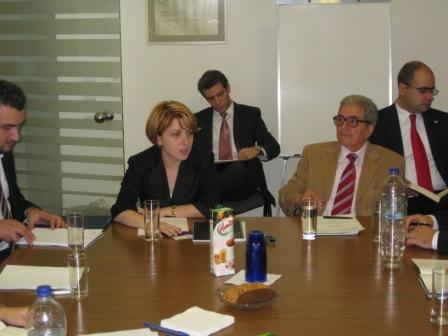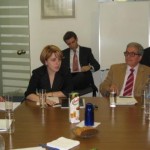The crisis that unfolded in the Caucasus region in August has reshuffled political thinking in the West with respect to the future steps to be taken in relations with Russia but has also raised questions as to how Georgia’s foreign policy will be shaped in the aftermath of the war. Ms. Eka Tkeshelasvili, Foreign Minister of Georgia, provided insight on the impact of the crisis on the course of her country’s foreign policy, in a lecture organized by ELIAMEP.
Russia and the ceasefire agreement
To date Moscow has not completed the pullout of its troops in the buffer zones established around the breakaway areas of South Ossetia and Abkhazia, which leaves Georgia in a difficult position. According to Ms. Tkeshelashvili the only way Moscow can restore its reliability as a diplomatic partner is by fully meeting its obligations as stipulated in the EU-mediated ceasefire agreement between the two countries. Furthermore, Georgia would have to be reassured that its sovereignty and independence as a nation are respected by Moscow.
Georgia and NATO membership
Even though Georgia was not admitted to the MAP process in the organization’s last summit in Bucharest, NATO’s secretary-general has confirmed that both Georgia and Ukraine will become NATO members eventually. Georgia’s request is to be reviewed by the Allied foreign ministers in December 2008.
Georgia will continue NATO accession endeavours as it hopes to see its security and territorial integrity safeguarded through partnership. Moreover, a seat in the Alliance would mean a great deal to Tbilisi in that it would receive acceptance on ‘this path Georgia has taken’.
Responding to members of the audience who argued that NATO membership doesn’t bring Georgia anything and that the EU would constitute a much better framework with its power of soft politics and security guarantee, Ms. Tkeshelashvili noted that prior to the war the EU had never signalled that Georgia would be encouraged in such a direction, but applauded the EU’s efforts for a cessation of hostilities.
Georgia intends to continue on the path of independence and would not voice disagreement in case of a new PCA between Europe and Russia, which is to be discussed in Nice next week. However, the EU should clarify to Russia that ‘Moscow will not get away with its disproportionate reaction in the war of August’.
Main priorities of Georgia’s foreign policy:
• Georgia considers it a top priority to get Russia to meets its ceasefire obligations and fully withdraw from the buffer zones.
• NATO membership is a priority for Georgia and a way for safeguarding its security
Professor Theodore Couloumbis, Vice President of the Board of Directors of ELIAMEP, moderated the lecture and ensuing discussion.
Athens, 6 November 2008
See also :
Interview with Ms. Tkeshelashvili.
Official website of the Ministry of Foreign Affairs of Georgia
The Chronicle of a Caucasian Tragedy (article in Der Spiegel)
Statements of FM Ms. Bakoyannis and her Georgian counterpart, Ms. Eka Tkeshelasvili




